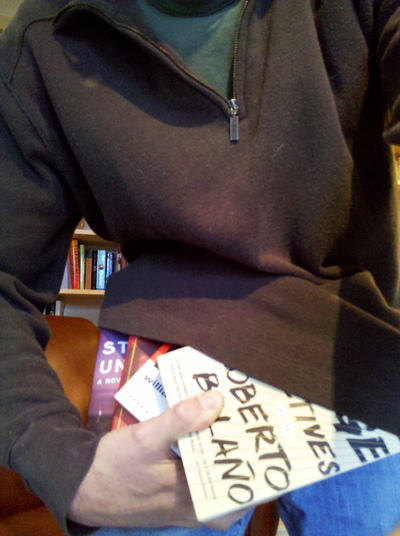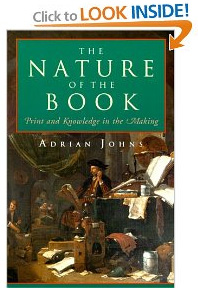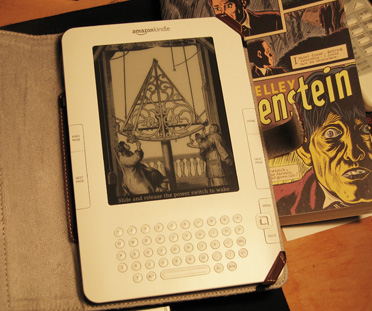Chris Roth animated this little video spot for a new children’s book coming out in August. It’s message is all about books being books and they don’t have anything more to them than the story they’re telling. I love a good e-reader perfectly well, but I still want a real book more than my e-reader. Every good book should have a cover. It’s as simple as that.
Category Archives: Book Publishing
Newsreel Film From 1947: Making Books
“This man is an author. He writes stories. He has just finished writing a story. He thinks many people will like to read it.” So begins this 1947 Encyclopedia Britannica film about how books are printed and bound. Almost none of what you see in the film, with the possible exception of the book trimming blade, exists anymore. It’s fascinating and horrifying at the same time. Fascinating because we get to see the mysterious process of making a book. Horrifying because we see how machines dictate the movements of human beings in an assembly line environment. It’s so dreadful that I may never want to read an old book again. Perhaps e-books are some kind of salvation after all.
Alice In Wonderland For iPad
I’ve got lots of grumps against Apple’s iPad, like the lack of support for Flash, one of the greatest web technologies in existence. But this Alice in Wonderland eBook looks fantastic. I’d love to make all the pictures move around and I think kids will too. This must be right because when I was a kid I fervently wished for every illustration to wake up and start moving.
Is Stealing eBooks Ethical?
 Is it ethical to steal an eBook if you’ve purchased the hardback version? Sure. Stealing the hardbacks themselves is much more fun though. Is it ethical for a publisher to charge what they charge for hardbacks? No way at all. Sorry publishers, your pricing sucks and you know it. So, certainly it’s ethical to steal an eBook if I’ve been robbed by the hardback price already.
Is it ethical to steal an eBook if you’ve purchased the hardback version? Sure. Stealing the hardbacks themselves is much more fun though. Is it ethical for a publisher to charge what they charge for hardbacks? No way at all. Sorry publishers, your pricing sucks and you know it. So, certainly it’s ethical to steal an eBook if I’ve been robbed by the hardback price already.
Now of course all the minimum wage proof readers in New York City will pounce on me and call me terrible names because they dread being turned into temp workers.
But stealing books is a real talent. You need a big army jacket that has lots of giant pockets inside and out. It’s best to steal them from large grocery and discount stores. eBooks are too easy to steal and you never really know what’s waiting for you on the other end of a download link anyway. The photo is of me demonstrating my own book-stealing technique. I have amassed quite the respectable library this way. But I never lend books out because they seldom make their way back home.
Here is an effort by a New York Times writer to answer the question of whether stealing ebooks is ethical or not if you’ve already bought the hardback.
But here’s a better piece at The Millions about an eBook pirate who’s pretty clear about what he likes.
Also, if you want to see how stealing books actually improves the world and culture, read The Savage Detectives by Roberto Bolaño.
The Nature of the Book
 I sat down with my Kindle e-reader on Saturday morning to read the Los Angeles Times. There was an article about an L.A. used bookstore called Iliad Books. Sounded nice. So I went. What should I find but a section of books about books and publishing. There was a copy of The Nature of the Book: Print and Knowledge in the Making by Adrian Johns. The author’s main thrust is to examine how books in early modern England influenced and largely caused the development of the modern scientific method and the general acquisition and spread of knowledge. He wonders why readers assume that books are accurate and fixed. This is an interesting inquiry in light of the recent changes in publishing which involve ever-changeable electronic publishing and web postings. The history of the effort to make books fixed and true representations of their authors’ intentions and ideas is a fascinating one. It includes an analysis of widespread piracy that dogged publishers of books from the very beginnings of printed material.
I sat down with my Kindle e-reader on Saturday morning to read the Los Angeles Times. There was an article about an L.A. used bookstore called Iliad Books. Sounded nice. So I went. What should I find but a section of books about books and publishing. There was a copy of The Nature of the Book: Print and Knowledge in the Making by Adrian Johns. The author’s main thrust is to examine how books in early modern England influenced and largely caused the development of the modern scientific method and the general acquisition and spread of knowledge. He wonders why readers assume that books are accurate and fixed. This is an interesting inquiry in light of the recent changes in publishing which involve ever-changeable electronic publishing and web postings. The history of the effort to make books fixed and true representations of their authors’ intentions and ideas is a fascinating one. It includes an analysis of widespread piracy that dogged publishers of books from the very beginnings of printed material.
Thinking about the nature of books and their history, along with the underworld of book manipulation, piracy, copyright, and the conveying of knowledge is essential as publishing undergoes its greatest changes since the beginnings of the printed page.
Reading On a Kindle Is a Pleasure
 After two years of reading reviews, watching products come out and compete, listening to people gripe about DRM and ebook pricing, I jumped directly into the fray and opted for the Kindle from Amazon.
After two years of reading reviews, watching products come out and compete, listening to people gripe about DRM and ebook pricing, I jumped directly into the fray and opted for the Kindle from Amazon. I am completely and utterly smitten with the thing. It feels like a magic book. No – more like a printing press. It’s got ink inside and the computer arranges the ink on the screen and it feels a little bit like you’re printing each page as you look at it. It’s wonderful. I don’t think I’ve ever read so much in a two-day stretch before. I’ve subscribed to the New York Times and Asimov’s Science Fiction magazine. I’ve purchased a single Amazon ebook for $9.99 and I’ve downloaded some free books from Project Gutenberg. It all works beautifully and makes for the single best addition to my library since I acquired a two-hundred-year-old copy of Don Quixote.